Finsbury Park: How cricket celebrations turned to sorrow
- Published
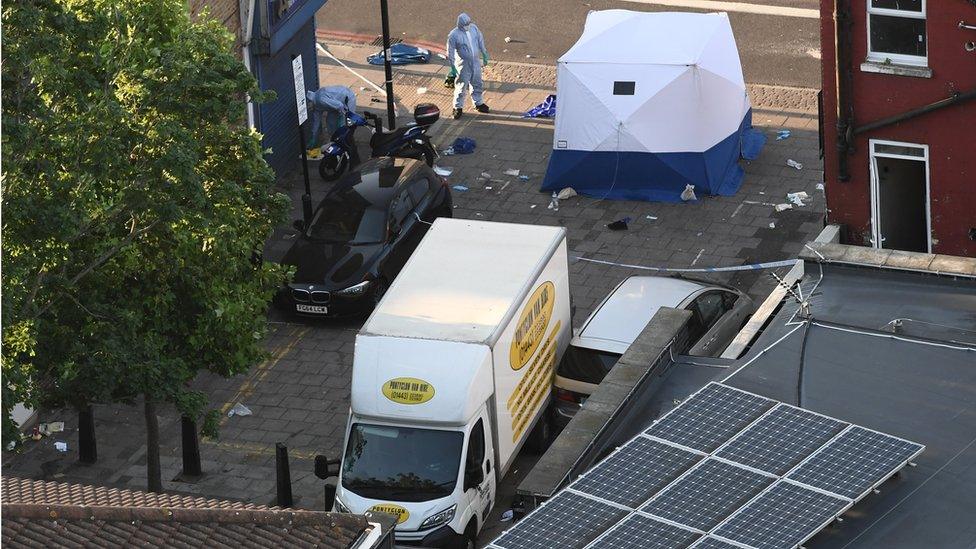
The scene following the attack in Finsbury Park
What started as a night of cricket celebrations for British Muslims turned to sorrow as news emerged of the Finsbury Park terror attack. It was a sickening reminder of a climate of Islamophobia felt by many across the UK.
Chants of people shouting "Pakistan Zindabad" (long Live Pakistan) were still echoing through the streets of Southall in West London late into Sunday night.
Cricket fans in the large Asian community had been celebrating Pakistan's victory over arch rivals India to win the coveted ICC Champions Trophy.
There was dancing, music and a sea of green and white flags waving in the air.
It was a carnival atmosphere not just in London but in other places like Bradford and Birmingham, which have large Pakistani communities.
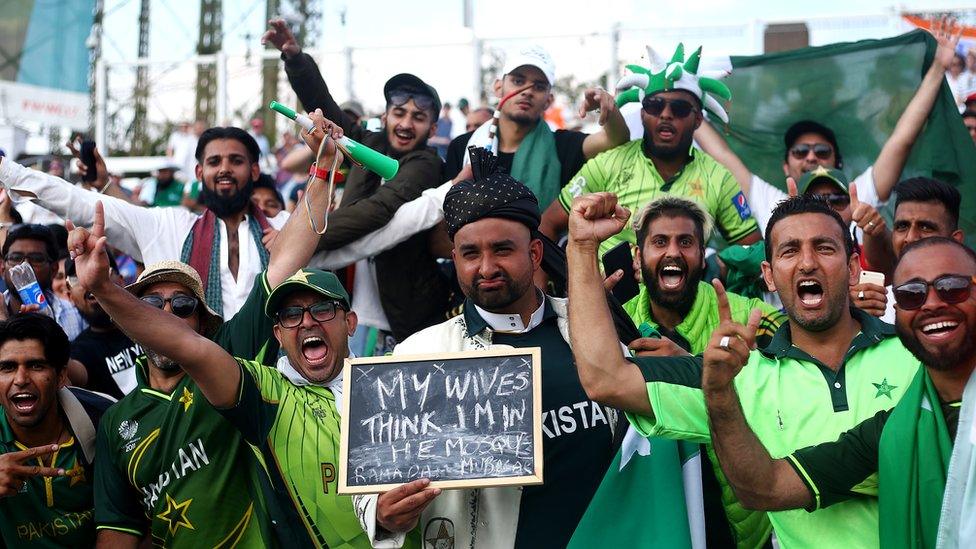
Pakistan fans in London celebrate the victory over India
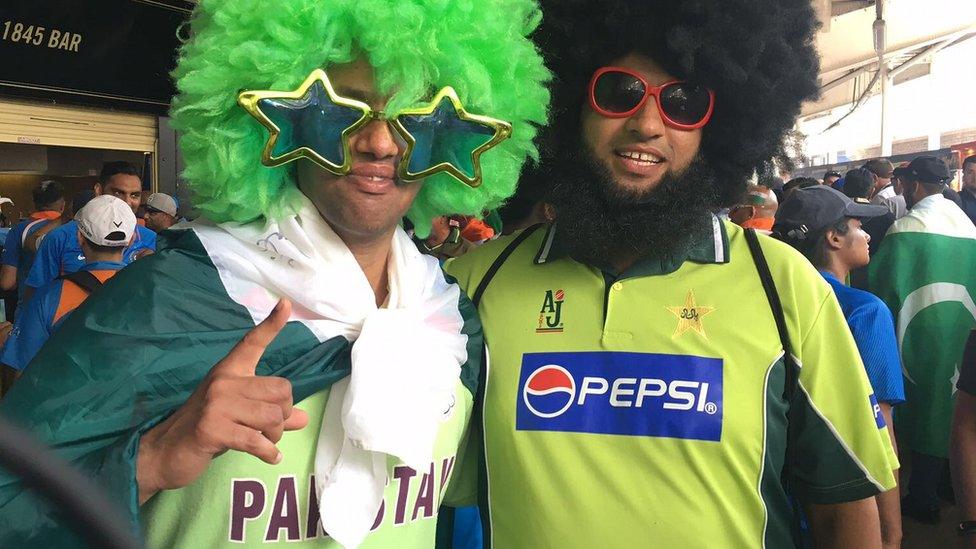
The green shirts of Pakistan were out in force for celebrations
The victory came in the holy month of Ramadan - a time when Muslims refrain from eating and drinking between sunrise and sunset. It's an auspicious time which brings families and friends together.
And the win over India made this time even more special for them. The conversations, as people broke their fasts, were all about the dramatic win and how the wickets had fallen that day.
There was lots of laughter and many young men wore their green cricket shirts with pride as they later joined other Muslims at mosques for Taraweeh prayers, the special prayers which are only recited during the month of Ramadan and are usually performed at the mosque.
But as Muslims prepared for Suhoor - the meal eaten before fasting - in the early hours of the morning, the tragic events in Finsbury Park were slowly coming to light.
News reports were of a white man in a van who had driven into a group of Muslim worshippers outside the mosque. The incident left most Muslims in a state of shock.
Many took to social media to express their feelings. "Saddened and sickened" and "Thoughts and prayers with those affected" were among the initial tweets.
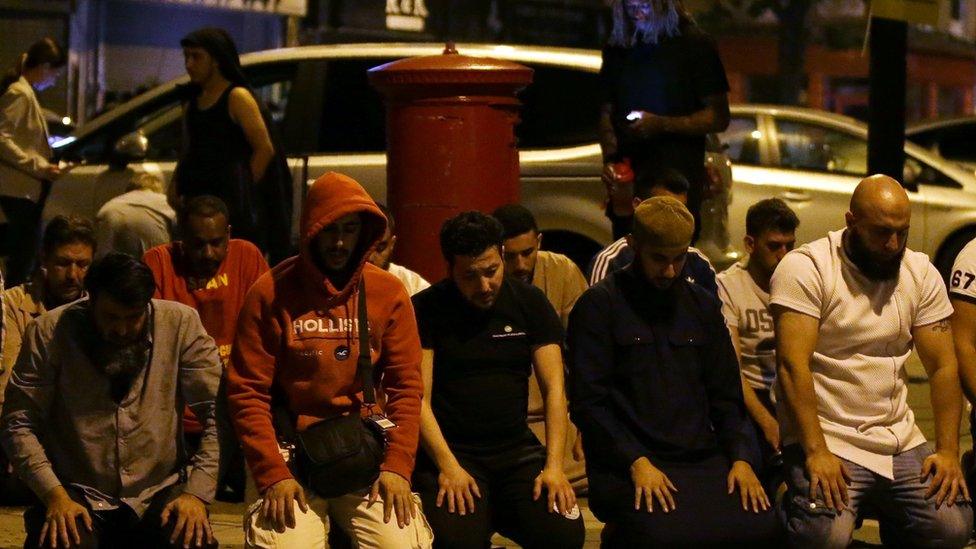
People prayed on the street after the attack
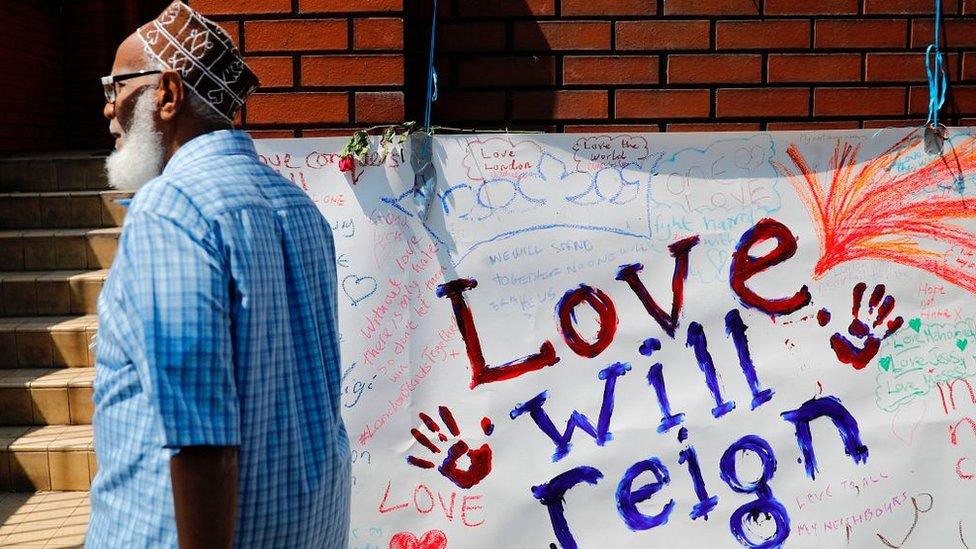
Many people in the Finsbury Park community have expressed unity
However, that shock soon turned to anger. This was an attack on mosque worshippers - and in the Holy month of Ramadan.
In the hours that followed, callers to the BBC Asian Network's Big Debate show questioned why the alleged attacker's mental health was being reported by some parts of the media as opposed to his religion.
One caller, Malik, said: "Why? Why? Others are associated with a particular faith and are said to be inspired by their faith... I don't understand."
Another caller, Imran Shah, said: "The authorities are not doing enough for the suffering of Muslims."
Actor Abdullah Afzal, who starred in the BBC sitcom Citizen Khan, tweeted, external: "Isis have killed thousands of Muslims, now whit terrorists have begun their attacks on Muslims. Extremely scary times for us all."
Mayor of London Sadiq Khan has called for Londoners to "come together and stay strong". He's reiterated that the capital is a "safe" place.
But do Muslims feel safe?
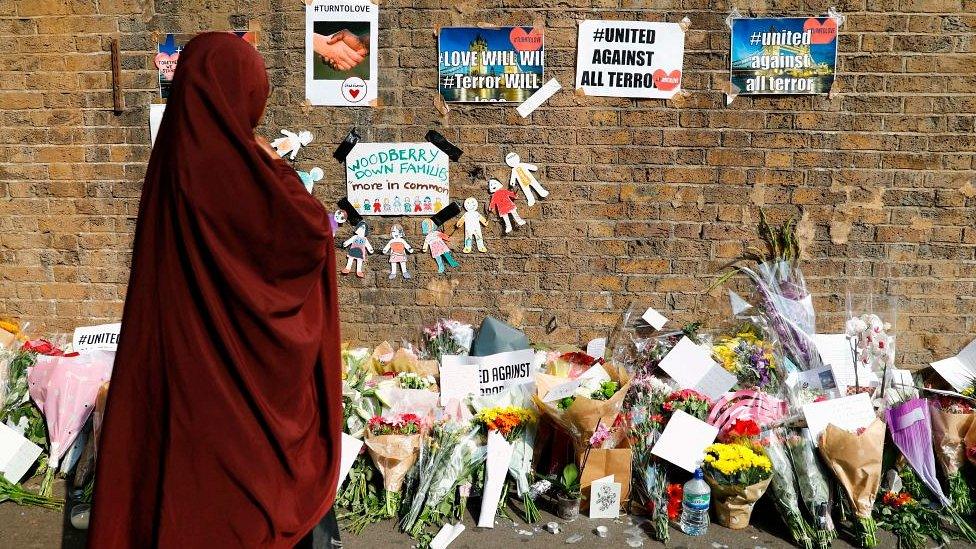
Many people have been visiting the scene of the attack to leave flowers
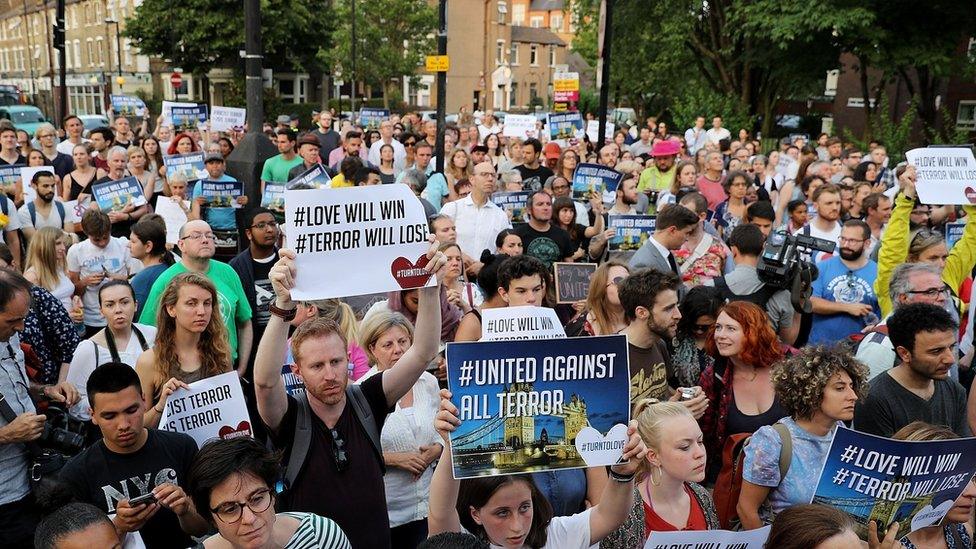
Hundreds took part in a vigil near Finsbury Park Mosque on Monday night
Twenty-four hours after the attack in Finsbury Park, the chatter during the breaking of fast was completely different. Islamophobia replaced cricket as the topic of conversation.
Almost everyone I spoke to had a story to tell about prejudice they had experienced over the last few months.
Sabina, a mother-of-four who wears the hijab, recounts how a coffee shop assistant "gave her the cold shoulder as she tried to make conversation" just last week.
Asma, from north-west London, witnessed a man in a supermarket car park "refusing to give the trolley to a woman wearing a headscarf because he thought she was a terrorist".
Mohsin, from south London, reveals how a pig's head was left at the door of his local mosque, along with graffiti plastered all over the wall, "making people afraid to go".
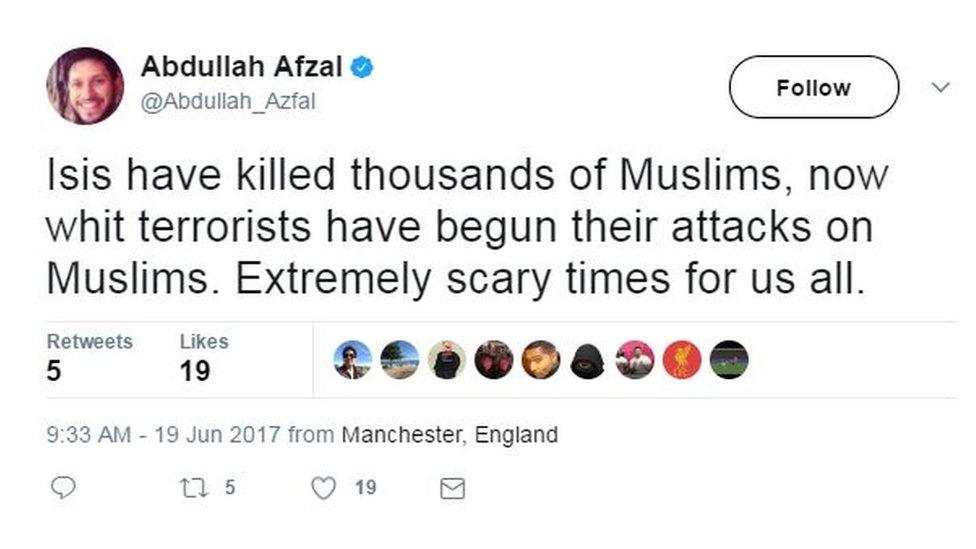
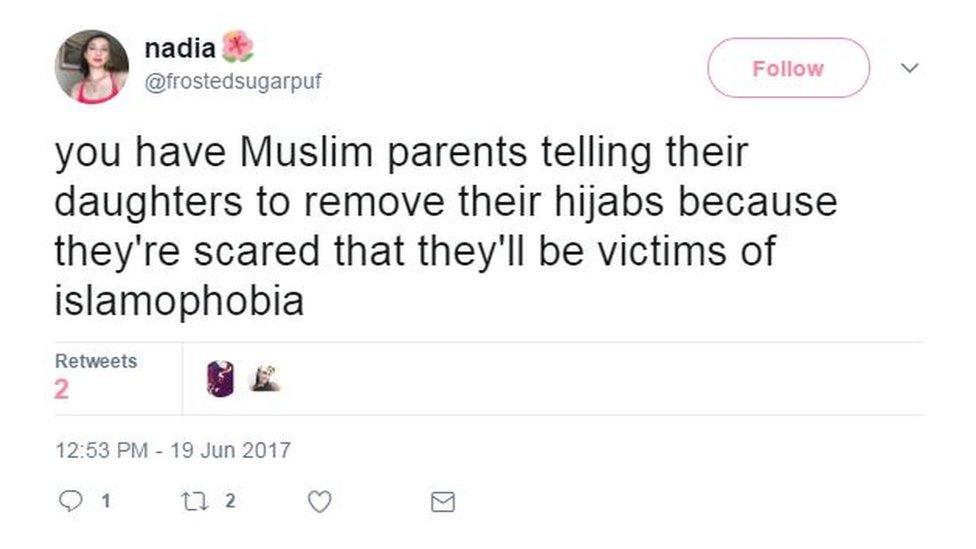
Many British Muslims describe experiencing "funny looks" from people and believe things have gone downhill over the last couple of years.
Last month the Mayor of London's office released figures showing a 40% increase in Islamophobic attacks in London. It has led to a real fear among some Muslims.
Speaking to Muslims after the London Bridge attack, some told me they wanted to change their appearance because of a fear of reprisals.
One 17-year-old A-Level student had trimmed his beard so that he doesn't outwardly appear like a Muslim.
A 19-year-old university student said she was wearing her hijab differently - "more like a turban rather than in the Arab style".
But many other Muslims are determined not to let attacks like Finsbury Park change their way of life.
Rabiya, from London, said: "We must stay united and not let people divide communities."
But she was clear on what needed to follow.
"Action needs to be taken on the perpetrators of the crime so these kind of attacks don't happen again."
- Published19 June 2017
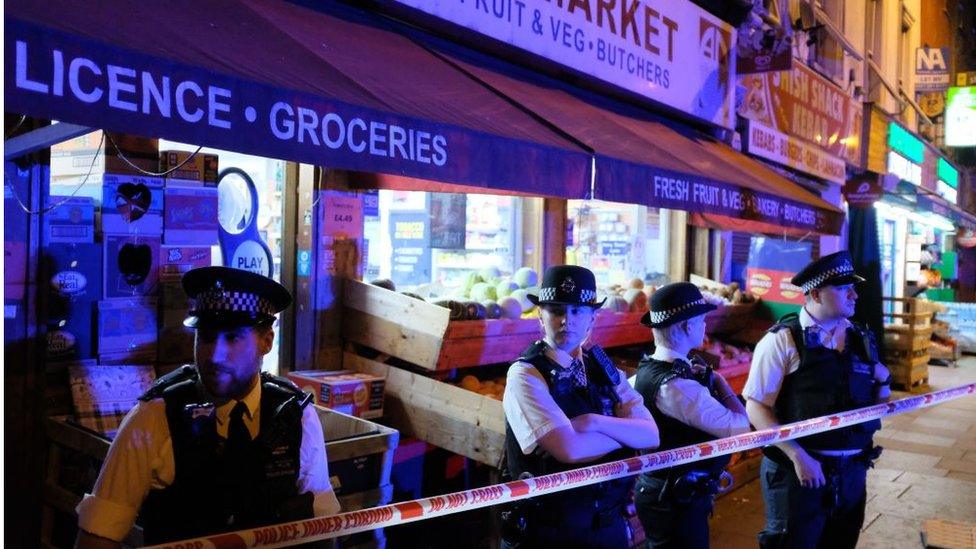
- Published20 June 2017
